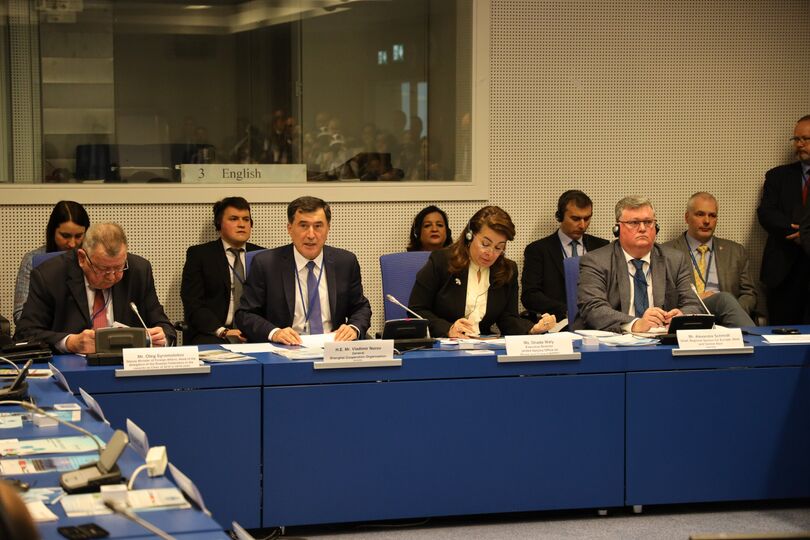A high-level side event titled SCO and UNODC in the Fight against the Illicit Drug Threat: Countering Drug Trafficking via Darknet was held in Vienna on 2 March on the sidelines of the 63rd session of the UN Commission on Narcotic Drugs (CND). The event was attended by over 70 delegates and CND guests.
Opening remarks were delivered by SCO Secretary-General Vladimir Norov, UN Under-Secretary-General and UNODC Executive Director Ghada Fathi Waly and Deputy Foreign Minister of Russia Oleg Syromolotov.
The gathering was moderated by Alexandre Schmidt, UNODC's Chief of the Regional Section for Europe, West and Central Asia.
Vladimir Norov pointed out that the number of internet users worldwide was unprecedentedly high — some 4 billion, 71 percent of them young people aged 15-24. He warned about the high possibility of criminal use of ICT, noting that organised crime operated mostly in the shadow segment of the Internet (Darknet), where special software is being used to sell narcotic drugs and mood-changing substances, weapons and other prohibited goods. According to recent surveys, drug trafficking accounts for some 60 percent of all transactions via the Darknet.
The SCO Secretary-General noted that the joint struggle against the proliferation of new psychoactive substances and drugs via the Darknet was a priority sphere of cooperation under the revised Anti-Drug Strategy and Action Programme. He emphasised in this context the importance of the International Anti-Drug Operation Spider Web, which is scheduled to be held in Moscow in late March to train people to block the delivery channels of synthetic and other narcotic drugs, including those that use online resources and virtual payment systems.
Vladimir Norov recalled that the SCO was among the first regional organisations to initiate active cooperation in the worldwide struggle against cybercrime. A major achievement in this struggle is a resolution on countering the use of information and communications technologies for criminal purposes adopted at the 74th session of the UN General Assembly.
UNODC Executive Director Ghada Fathi Waly remarked that the international community was getting increasingly more concerned about drug trafficking via the Darknet, where drug deals account for approximately 50 percent of all transactions.
She added that the drug problem was especially important for the SCO countries, which are home to some 1 billion young people who are the main target of the criminal groups that are using modern technology. The UNODC official underlined the importance of joint events held to implement the provisions of the resolution on cooperation between the United Nations and the Shanghai Cooperation Organisation adopted at the 73rd session of the UN General Assembly.
She added that the drug problem was especially important for the SCO countries, which are home to some 1 billion young people who are the main target of the criminal groups that are using modern technology. The UNODC official underlined the importance of joint events held to implement the provisions of the resolution on cooperation between the United Nations and the Shanghai Cooperation Organisation adopted at the 73rd session of the UN General Assembly.
Deputy Foreign Minister of Russia Oleg Syromolotov pointed out that those special SCO-UN events had become a positive tradition and evidence of sustainable cooperation between the two organisations. He also mentioned the SCO Secretariat's active cooperation with the Paris Pact Initiative, which led to the holding of two Paris Pact expert meetings at the SCO Secretariat.
Reports at the panel discussion were delivered by the heads of delegations from the SCO countries, including Director General of the Indian Narcotics Control Bureau Rakesh Asthana, Head of the Kazakhstani Interior Ministry's Department for Combating Drug Crime Tlegen Matkenov, Deputy Director of China's National Narcotics Control Commission Zeng Weixun, Head of the Service for Combating Illegal Drug Trafficking of Kyrgyzstan Oleg Zapolsky, Pakistani Minister for Narcotics Control Shahryar Khan Afridi, Director of the Drug Control Agency under the President of Tajikistan Sherkhon Salimzoda, and Director of the National Information-Analytical Centre on Drug Control at the Cabinet of Ministers of Uzbekistan Olim Narzullayev.
During the event, experts from UNODC and Russia's Foreign Ministry delivered presentations on the practical aspects of combating drug trafficking on the Darknet.
The SCO has been cooperating with the UN since 2004. It was granted observer status at the General Assembly by a resolution adopted on 2 December 2004.
In 2010 in Tashkent, the sides signed a Joint Declaration on Cooperation between the Secretariat of the Shanghai Cooperation Organisation and the United Nations Organisation.
In 2011, a Memorandum of Understanding between the Secretariat of the Shanghai Cooperation Organisation and the UN Office on Drugs and Crime was signed in Nur-Sultan (Astana). The UNODC and the SCO have since developed joint expert, analytical and information projects and have taken efforts to promote their joint fight against narcotic drugs. SCO experts are invited to contribute to the work of the UNDOC and attend expert meetings within the framework of the Paris Pact Initiative.
In 2018, SCO countries adopted in Qingdao the Anti-Drug Strategy and Action Programme for 2018-2023, as well as the Concept to Prevent the Abuse of Narcotic Drugs and Psychotropic Substances.
The SCO and UNODC have regularly held joint high-level side events on the sidelines of UNODC sessions since 2017.
